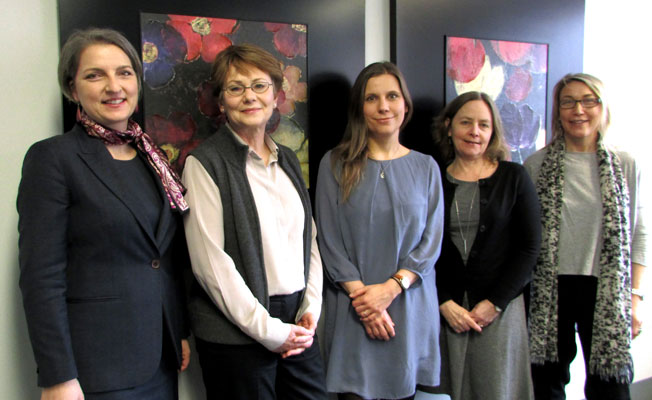
Drs. Karin Humphries, Martha Mackay, Eric Grafstein and colleagues recently presented their research on sex differences in cardiac troponin (cTn) at the European Society of Cardiology Prevention Meeting. cTn is key in the diagnosis of myocardial infarction. Researchers found women were more likely to have cTn levels below the diagnostic threshold and women experienced less chest pain than men, even at the highest cTn levels. While evidence-based medication use increased with cTn level and was highest when chest pain was associated with cardiac features or cardiac history, medication use was lower in women irrespective of cTn levels or chest pain features.
CHÉOS Researchers Dr. Peter Dodek, Jean-Francois Kozak, Monica Norena, and Hubert Wong have published work showing that more men than women are admitted to ICUs even after adjustment for admitting diagnoses, comorbidities, and socioeconomic factors. Dr. Dodek is now working with a national team funded by the Canadian Frailty Network (formerly known as the Technology Evaluation in the Elderly Network), to further study this finding. They have found that this sex difference is not explained by differences in social factors such as marital status or caregiver supports (unpublished data) in three different cohorts. Researchers are now directing their efforts to asking citizens about their perspectives regarding ICU admission in order to further investigate this sex difference.
Publication Link
Dr. Joel Singer was the methodological lead for the Controlling Hypertension in Pregnancy Study (CHIPS), a large, international randomized controlled trial. The main results, published in the New England Journal of Medicine, indicated there was no difference between controlling hypertension tightly (target dBP of 85) compared to less tightly in terms of adverse perinatal outcomes in women with hypertension in pregnancy. However, because there were more episodes of severe hypertension and a trend toward more serious maternal outcomes in the less tight group, the investigators suggested that tight control is the better option. Researchers also found that methyldopa, an older, less-used anti-hypertensive, was an appropriate alternative to labetolol in this population.
Publication Link
Dr. Martha Mackay and colleagues have published results regarding sex differences in symptoms of myocardial ischemia using balloon inflation during angioplasty as a model for spontaneous ischemia. Researchers found that there were no sex differences in the reported rates of chest pain between men and women, but that women reported throat, jaw, and neck pain significantly more than men did.
Publication Link
Dr. Nadia Khan and colleagues with the GENESIS-PRAXY study researched sex differences in heart attack symptoms. This prospective cohort study found that chest pain was the most common acute coronary syndrome symptom in both women and men. However, women were more likely to present without chest pain than men (19.0% vs. 13.7%), and young women without chest pain had fewer symptoms in general than women with chest pain, with similar findings in men. Women without chest pain, however, had more symptoms than men without chest pain.
Publication Link
CHÉOS Scientist Dr. Joel Singer and Methodologist Joseph Puyat worked on a feasibility study for a model that encourages physical activity. Researchers studied the Everyday Activity Supports You (EASY) model in healthy, inactive, community-dwelling women 55 to 70 years of age. Women randomized into the treatment arm received group-based education and social support, an individualized physical activity prescription, and use of a Fitbit activity monitor. The control group received health-related information only. Investigators collected information on activity patterns and health-related outcomes such as body composition, blood pressure, and psychosocial variables. Results indicated an increase in physical activity and a reduction in weight and blood pressure for intervention participants at six months.
Publication Link
Drs. Iris Torchalla, Michael Krausz, and Verena Strehlau investigated gender-related patterns of substance use disorder (SUD), post-traumatic stress disorder (PTSD), and their comborbidity in women and men. Researchers found that women and men had almost identical SUD prevalence rates, but the rates of PTSD were higher in women than in men (28% vs. 16%). Furthermore, they observed significant main effects of both PTSD and gender on clinical outcome variables among individuals who had current SUD, as well as significant interaction effects. This indicated that PTSD diagnosis was associated with a greater suicide risk only among women, and that among participants with PTSD, psychological distress scores were substantially higher for women than for men. Overall, women with PTSD had the most severe pattern of psychosocial impairment in this study.
Publication Link
Gender Matters was a study of gender differences in addiction treatment access, outcomes, and health among long-term opioid-dependent men and women in Vancouver’s Downtown Eastside. This work was conducted as part of CHÉOS PhD Trainee Heather Palis’s M.Sc. thesis under the supervision of Dr. Eugenia Oviedo-Joekes. Thematic analyses of men’s and women’s experiences with opioid maintenance treatment (i.e. methadone and suboxone) revealed unique patterns of experience by gender. For example, women focused on the desire for more collaborative care (e.g. shared decision-making, improved communication) while men discussed challenges with treatment accessibility and environments (e.g. daily pharmacy visits). Narratives around men’s and women’s distinct treatment experiences have the potential to inform health and treatment services that are both suitable and effective for those struggling with opioid dependence.



